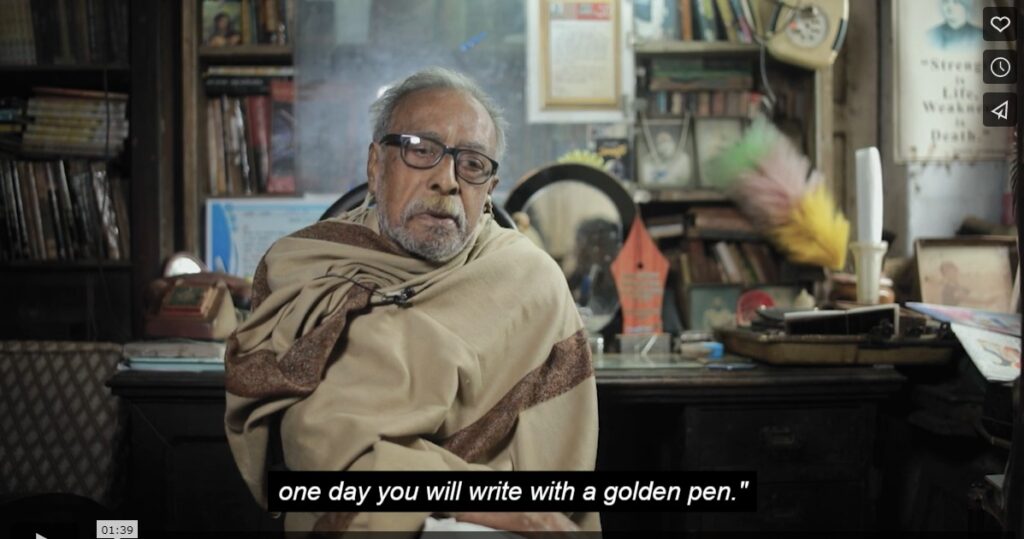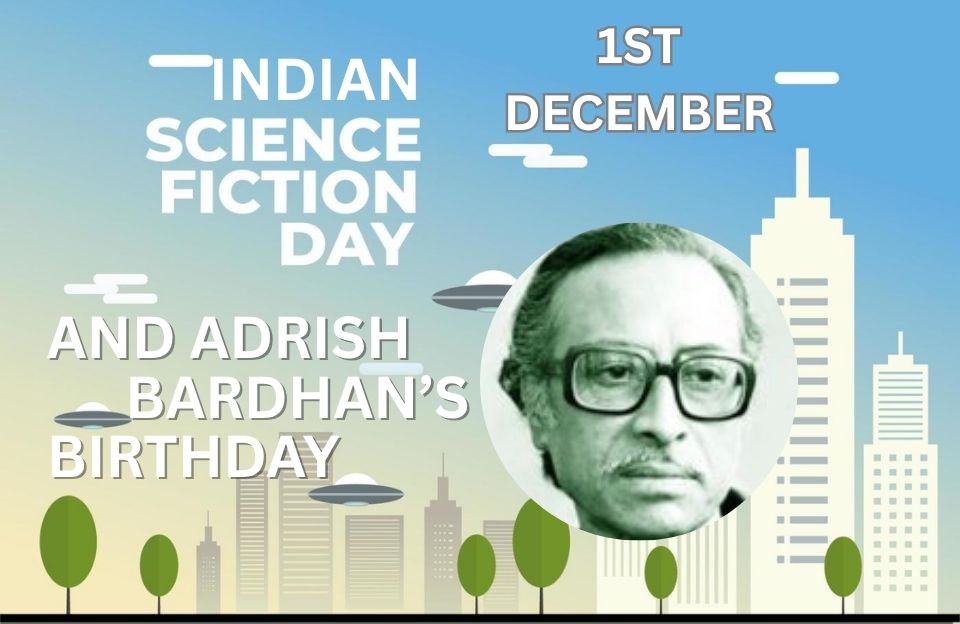Indian Science Fiction Day: Celebrating Adrish Bardhan
When is Indian Science Fiction Day?
No, there hasn’t been any official government announcement. Yet, one specific day holds exactly that significance. December first (1st Dec) is the birthday of a man without whom Bengali science fiction might never have reached where it stands today.
You’ve guessed it right – it is the birthday of the legendary figure of Indian science fiction, Shri Adrish Bardhan.
But why is there a call to declare Indian Science Fiction Day on his birthday? Let’s take a look back.
Bengali science fiction has undergone significant maturation in recent years. Partly on its own, and partly guided by the hands of a few pioneers in the early days. Among them, the person who, driven purely by his inner calling, dared to introduce a different kind of literary genre in the politically turbulent Bengal of the 1960s – a Bengal plagued by infiltration problems and devastated by food shortages – was Adrish Bardhan.
Adrish wasn’t the first to write science fiction in Bengali. There’s even room for debate about whether his original science fiction writings deserve the title of “the best.” So what did he do that earned him unanimous recognition as the ‘Bhagiratha of Indian science fiction’? After all, even luminaries like Premendra Mitra or Satyajit Ray, despite their respective brilliance in science fiction, aren’t given this title!
The truth is, Adrish was a leader – a chief. He gave Bengali science fiction a specific direction, showed it the way, and elevated it to the status of serious literature entirely through his own efforts. Those who wrote science fiction before him wrote only a few stories spontaneously, most of which were science-based. None of them showed particular interest in writing more extensively in this genre or exploring it further. Perhaps it wasn’t clear to them that science fiction could become a powerful instrument of social consciousness. They wrote such stories somewhat subconsciously, but often couldn’t get them published. Who knows – what if people thought it was nonsense, what if people didn’t read it? Editors’ understanding of science fiction wasn’t mature at all in those days.
It was precisely at this moment that Adrish appeared on the scene. Young age – boundless vitality. He had extensively studied foreign science fiction, fantasy, and speculative fiction. He realized that science fiction had tremendous potential in Bengal, but there was no one to harness it. So, driven by determination, he took the risk of publishing a magazine himself. With his own money, literally sacrificing his personal resources, “Ascharya!” (Wonder!) was published. While not everyone understood it at the time, connoisseurs recognized the gem. Satyajit Ray came forward to help Adrish. Satyajit had always been enthusiastic about working with mature science fiction in Bengali. Seeing Adrish’s determination, perseverance, and focus, despite his thousand other commitments, he began helping him through writing, illustrations, and advice. “Ascharya!” moved forward with unstoppable momentum, winning readers’ hearts. Along with the term “kalpabigyan” (science fiction) in Bengali, a new literary form was established through Adrish’s efforts.
Adrish Bardhan was the first to globalize science fiction literature in Bengal. He translated numerous foreign works and brought them to the people’s doorstep, made Bengalis taste world literature, and by writing different kinds of stories, opened up the rigid chambers of people’s minds – all these tasks he accomplished with unparalleled skill. Luminaries like Ranen Ghosh, Amitananda Das, Sankarshan Ray, Gurnek Singh, Rebanta Goswami, Enakshi Chattopadhyay, and Anish Deb were among those inspired by Adrish. Ranen Ghosh reminisced that Adrish was such a strict editor that in those days, he would raid writers’ homes and sit there, saying he wouldn’t leave until the writing was finished. This dedication resulted in Bengali science fiction literature receiving one extraordinary talented writer after another.
There are numerous examples of pulp fiction magazines being published abroad. But in this country, “Ascharya!” was no less than those in quality and variety. Science fiction poetry, short stories, news about science fiction from home and abroad, book reviews, serialized novels, etc., were published regularly. After his wife died in 1971, Adrish’s life rhythm was disrupted. The grave responsibility of raising children and the absence of his beloved temporarily seemed to ebb his tremendous vitality. Finally, “Ascharya!” ceased publication in 1972.

From then on, he mainly worked on translations for several years. After completing the translation of Jules Verne, he also finished translating Sherlock Holmes. These two translations alone would have been enough to immortalize Adrish in Bengali literature. But he was not someone to be satisfied with little. In 1975, along with Ranen Ghosh, he published another magazine, named “Fantastic.” Satyajit Ray himself designed the magazine’s nameplate. The magazine ran regularly for several years before closing down around 2000.
Adrish has plenty of original writings. But he seemed to deliberately avoid making much fuss about his own writing for the sake of literature, for the sake of science fiction. He encouraged young writers to write more, created platforms for them to express themselves, and in short, he dedicated his life solely to the advancement of Bengali science fiction. Though he had other writings, he kept that aspect suppressed. This master never deviated from his goal!
And this is where Adrish differed from the rest. Others worked with science fiction and did very well, but they didn’t make science fiction their meditation and life. Science fiction remained a small part of their work. Adrish lovingly collected that small part from everyone, going door to door. And with those fragments, he built a magical world of Bengali science fiction. Even now, when one takes a mental journey there, one is amazed by examples of Adrish’s foresight.
Science fiction is a vast and extensively spread chapter of literature. Much work has been done on this worldwide. This genre, infused with the fragrance of each country’s culture and customs around the world, contains numerous gems. Adrish not only taught Bengalis to recognize this stream of literature but also dug adequate channels to make it flow vigorously to the best of his ability. He not only founded two of the country’s first SF magazines, but his achievements also established a SF cine club (probably the first one in Asia), a SF mail club, SF radio recordings, and many more. Today’s “Kalpabiswa” (Sci-Fi World) is the fruit of his efforts. And then we all together remember that Bhagiratha, who single-handedly and with amazing ability brought serious science fiction literature from various corners of the world and planted it in Bengal’s soft soil.
India is home to over twenty official languages, but few among them can boast as rich and enduring a legacy in science fiction as Bengali. Yet, even within this diverse literary landscape, there has been no writer, editor, or publisher quite like Adrish Bardhan. What he accomplished in the 1960s remains unmatched — a visionary feat that, even today, feels more like a dream than a goal within reach.
We believe it is only fitting to honor his legacy by dedicating his birthday, 1st December, as Bengali as well as Indian Science Fiction Day.



